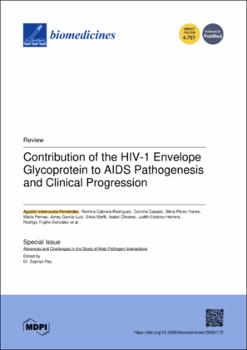Contribution of the HIV-1 Envelope Glycoprotein to AIDS Pathogenesis and Clinical Progression.
Fecha
2022Resumen
In the absence of antiviral therapy, HIV-1 infection progresses to a wide spectrum of clinical
manifestations that are the result of an entangled contribution of host, immune and viral factors. The
contribution of these factors is not completely established. Several investigations have described the
involvement of the immune system in the viral control. In addition, distinct HLA-B alleles, HLA-B27,
-B57-58, were associated with infection control. The combination of these elements and antiviral host
restriction factors results in different clinical outcomes. The role of the viral proteins in HIV-1 infection
has been, however, less investigated. We will review contributions dedicated to the pathogenesis
of HIV-1 infection focusing on studies identifying the function of the viral envelope glycoprotein
(Env) in the clinical progression because of its essential role in the initial events of the virus life-cycle.
Some analysis showed that inefficient viral Envs were dominant in non-progressor individuals. These
poorly-functional viral proteins resulted in lower cellular activation, viral replication and minor viral
loads. This limited viral antigenic production allows a better immune response and a lower immune
exhaustion. Thus, the properties of HIV-1 Env are significant in the clinical outcome of the HIV-1
infection and AIDS pathogenesis.






